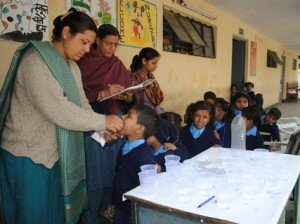The New York Times “Fixes” blog recently featured an article by Amy Lee, which profiled our partner Deworm the World’s campaign in India. “In India, a Small Pill, With Positive Side Effects,”discusses the benefits of deworming programs and the need for more large-scaled programs.
There are more than 600 million school-age children worldwide that have intestinal worms. The diseases they cause can have debilitating symptoms, such as diarrhea, anemia, internal bleeding, malnutrition and stunted physical and mental growth.
Fortunately, people are becoming more aware of how easy and inexpensive it is to treat worms, as well as all the socioeconomic benefits that come with deworming. Lee’s article highlights the research of two economists, Michael Kremer (founder of Deworm the World), and Edward Miguel of the University of California, Berkeley, who found that deworming programs helped to reduce school absences by 25% in a sample of schools in Kenya. Their research also showed that children who are regularly dewormed earn over 20% more as adults, while those infected are 13% less likely to be literate.

A young student at a government school in north Delhi, India, received a deworming pill in the capital’s first mass deworming campaign in February 2012. Photo Credit: Amy Lee
Large-scale deworming programs are vulnerable to many obstacles. There is a general lack of awareness, as many “in the developing world [believe] that they [worms] are considered a part of childhood… and [therefore] are usually left untreated” states Lee. Even though millions are infected with intestinal worms, historically few people have advocated for their control. Director general of the World Health Organization Margaret Chan explained best in a 2010 report – “these diseases are “largely silent, as the people affected or at risk have little political voice.”
Despite the challenges, deworming campaigns across the globe have seen tremendous success. In 2009, with help from Deworm the World, 3.6 million children were dewormed in Kenya. In January Prime Minister Odinga of Kenya promised to deworm five million children annually until 2017. About 3.7 million children in India’s capital, Delhi, have taken the chewable pill, mebendazole, as part of a deworming campaign. In other places in India, such as the western state, Bihar, 17 million schoolchildren were dewormed last year, and in the southern state Andhra Pradesh, 2 million children in 2009, were treated.
Intestinal worms are a horrific health burden, not only for the individual, but for an entire community. These successful large-scale deworming programs show that neglected tropical diseases can be beaten.
Click here to read Amy Lee’s article.
Click here to learn more about Deworm the World, a global campaign founded in 2007 by Harvard University economist, Michale Kremer, that supports governments and development partners in expanding school-based deworming programs.
And if you haven’t done so already, watch , which features Deworm the World’s work in India.
